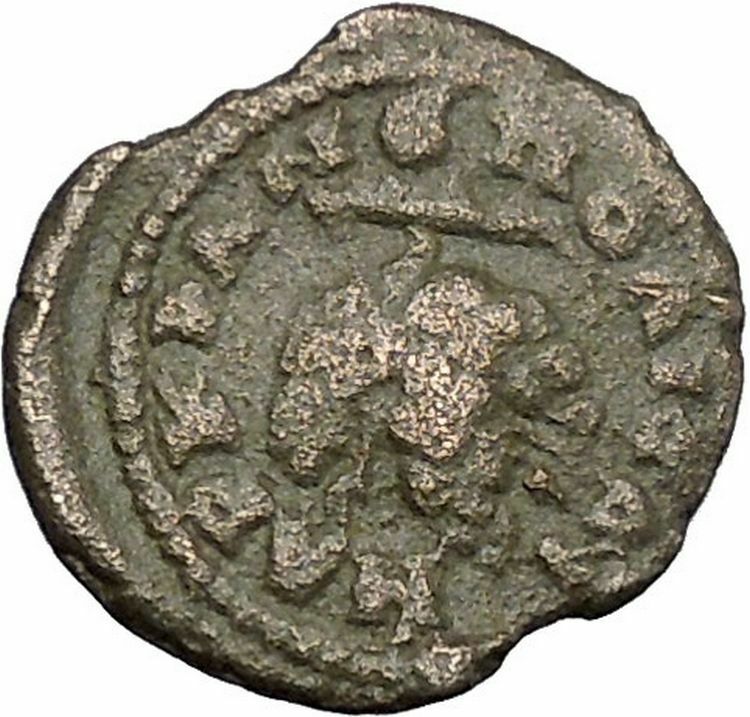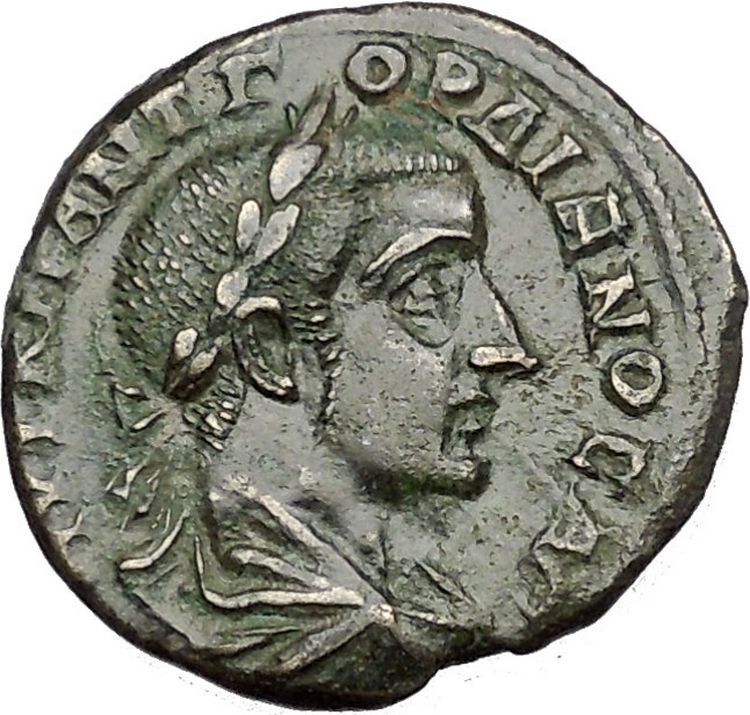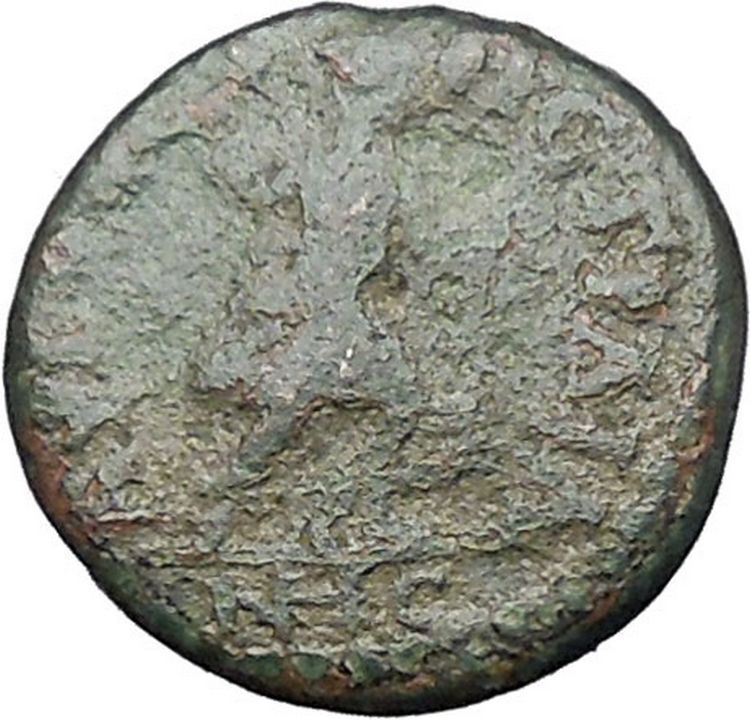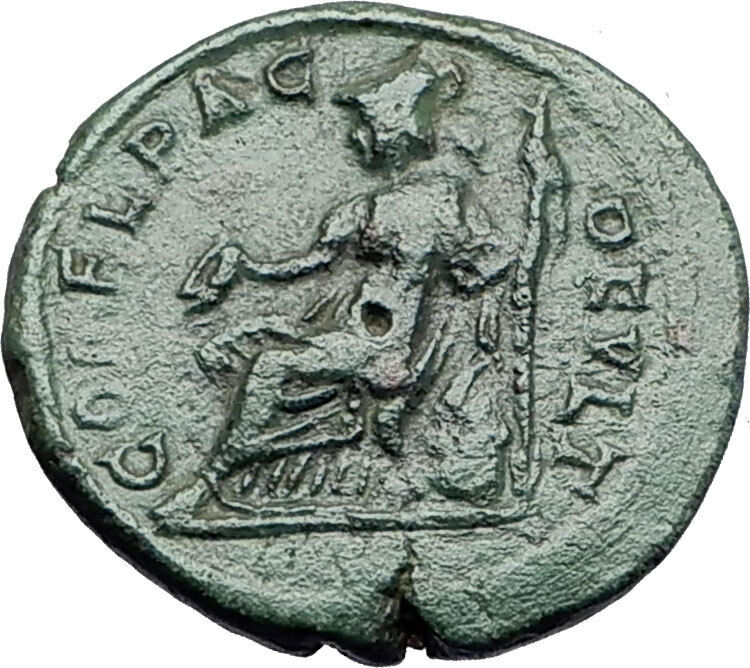|
Antoninus Pius
–
Roman Emperor
: 138-161 A.D.
Billon Silver Tetradrachm 23mm (12.85 grams)
Year 13 of Reign = 149/150 A.D.
Struck at the mint of Alexandria in Egypt
Reference: Dattari 2277; Geissen 1628
ANTWNINOC CЄV. ЄVCЄ, Laureate and draped bust
right.
Nike
(Victory)
standing on globe right, holding wreath and palm, date L ΙΓ across fields.
You are bidding on the exact
item pictured, provided with a Certificate of Authenticity and Lifetime
Guarantee of Authenticity.
In
Greek mythology
,
Nike
was a goddess
who personified
victory
, also known as the Winged Goddess of
Victory. The Roman equivalent was
Victoria
. Depending upon the time of various
myths, she was described as the daughter of
Pallas
(Titan) and
Styx (Water) and the sister of
Kratos
(Strength),
Bia
(Force), and
Zelus
(Zeal). Nike and her siblings were close
companions of Zeus
, the dominant deity of the
Greek pantheon
. According to classical (later)
myth, Styx brought them to Zeus when

the
god was assembling allies for the
Titan War
against the older deities. Nike
assumed the role of the divine
charioteer
, a role in which she often is
portrayed in Classical Greek art. Nike flew around battlefields rewarding the
victors with glory and fame.
Nike is seen with wings in most statues and paintings. Most other winged
deities in the Greek pantheon had shed their wings by Classical times. Nike is
the goddess of strength, speed, and victory. Nike was a very close acquaintance
of Athena
, and is thought to have stood in
Athena’s outstretched hand in the statue of Athena located in the Parthenon.
Nike is one of the most commonly portrayed figures on Greek coins.
Names stemming from Nike include amongst others:
Nicholas
, Nicola, Nick, Nikolai, Nils, Klaas,
Nicole, Ike, Niki, Nikita, Nika, Niketas, and Nico.
Alexandria was founded
by
Alexander the Great
in April 331 BC as
Ἀλεξάνδρεια (Alexándreia).
Alexander’s
chief architect
for the project was
Dinocrates
. Alexandria was intended to
supersede Naucratis
as a
Hellenistic
center in Egypt, and to be the link
between Greece and the rich
Nile Valley. An Egyptian city,
Rhakotis
, already existed on the shore, and
later gave its name to Alexandria in the
Egyptian language
(Egyptian *Raˁ-Ḳāṭit,
written rˁ-ḳṭy.t, ‘That which is built up’). It continued to exist as the
Egyptian quarter of the city. A few months after the foundation, Alexander left
Egypt and never returned to his city. After Alexander’s departure, his viceroy,
Cleomenes
, continued the expansion. Following a
struggle with the other successors of Alexander, his general
Ptolemy
succeeded in bringing Alexander’s body
to Alexandria.
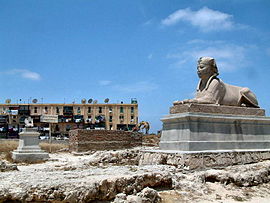
Alexandria, sphinx made of
pink granite
,
Ptolemaic
.
Although Cleomenes was mainly in charge of overseeing Alexandria’s continuous
development, the Heptastadion and the mainland quarters seem to have been
primarily Ptolemaic work. Inheriting the trade of ruined
Tyre
and becoming the centre of the new
commerce between Europe and the
Arabian
and Indian East, the city grew in less
than a generation to be larger than
Carthage
. In a century, Alexandria had become
the largest city in the world and, for some centuries more, was second only to
Rome. It became Egypt’s main Greek city, with
Greek people
from diverse backgrounds.
Alexandria was not only a centre of
Hellenism
, but was also home to the largest
Jewish community in the world. The
Septuagint
, a Greek translation of the
Hebrew Bible
, was produced there. The early
Ptolemies kept it in order and fostered the development of its museum into the
leading Hellenistic center of learning (Library
of Alexandria), but were careful to maintain the distinction of its
population’s three largest ethnicities: Greek, Jewish, and
Egyptian
. From this division arose much of the
later turbulence, which began to manifest itself under
Ptolemy Philopater
who reigned from 221–204 BC.
The reign of
Ptolemy VIII Physcon
from 144–116 BC was marked
by purges and civil warfare.
The city passed formally under Roman jurisdiction in 80 BC, according to the
will of
Ptolemy Alexander
, but only after it had been
under Roman influence for more than a hundred years. It was captured by
Julius Caesar
in 47 BC during a Roman
intervention in the domestic civil war between king
Ptolemy XIII
and his advisers, and the fabled
queen
Cleopatra VII
. It was finally captured by
Octavian
, future
emperor
Augustus on 1 August 30 BC, with the
name of the month later being changed to August to commemorate his
victory.
In AD 115, large parts of Alexandria were destroyed during the
Kitos War
, which gave
Hadrian
and his architect,
Decriannus
, an opportunity to rebuild it. In
215, the
emperor
Caracalla
visited the city and, because of some
insulting satires
that the inhabitants had directed at
him, abruptly commanded his troops to
put to death
all youths capable of bearing
arms. On 21 July 365, Alexandria was devastated by a
tsunami
(365
Crete earthquake),[3]
an event still annually commemorated 17 hundred years later as a “day of
horror.”[4]
In the late 4th century, persecution of
pagans
by newly Christian Romans had reached
new levels of intensity. In 391, the Patriarch
Theophilus
destroyed all pagan temples in
Alexandria under orders from Emperor
Theodosius I
. The
Brucheum
and Jewish quarters were desolate in
the 5th century. On the mainland, life seemed to have centred in the vicinity of
the Serapeum and
Caesareum
, both of which became
Christian churches
. The
Pharos
and Heptastadium quarters,
however, remained populous and were left intact.[citation
needed]
In 619, Alexandria
fell
to the
Sassanid Persians
. Although the
Byzantine Emperor
Heraclius
recovered it in 629, in 641 the Arabs
under the general
Amr ibn al-As
captured it during the
Muslim conquest of Egypt
, after a siege that
lasted 14 months.

Titus Aurelius Fulvus Boionius Arrius Antoninus (19 September 86 – 7
March 161), generally known in English as Antoninus Pius was
Roman emperor
from 138 to 161. He was the fourth of the
Five Good Emperors
and a member of the
Aurelii
. He
did not possess the
sobriquet
“Pius” until after
his accession to the throne. Almost certainly, he earned the name “Pius” because
he compelled the
Senate
to deify his adoptive father
Hadrian
; the
Historia Augusta
, however, suggests that he may have earned the name by
saving senators sentenced to death by Hadrian in his later years.
//
Early
life
Childhood
and family
He was the son and only child of
Titus Aurelius Fulvus
,
consul
in 89
whose family came from
Nemausus
(modern Nîmes
)
and was born near
Lanuvium
and his mother was Arria Fadilla. Antoninus’ father and paternal grandfather
died when he was young and he was raised by
Gnaeus Arrius Antoninus
, his maternal grandfather, a man of integrity and
culture and a friend of
Pliny the Younger
. His mother married to Publius Julius Lupus (a man of
consular rank),
Suffect
Consul
in 98, and bore him a daughter called Julia Fadilla.
Marriage
and children
As a private citizen between 110 and 115, he married Annia Galeria
Faustina the Elder
. They had a very happy marriage. She was the daughter of
consul
Marcus Annius Verus
and
Rupilia
Faustina (a half-sister to Roman Empress
Vibia
Sabina
). Faustina was a beautiful woman, renowned for her wisdom. She spent
her whole life caring for the poor and assisting the most disadvantaged Romans.
Faustina bore Antoninus four children, two sons and two daughters. They were:
- Marcus Aurelius Fulvus Antoninus (died before 138); his sepulchral
inscription has been found at the Mausoleum of Hadrian in Rome.
- Marcus Galerius Aurelius Antoninus (died before 138); his sepulchral
inscription has been found at the Mausoleum of Hadrian in Rome. His name
appears on a Greek Imperial coin.
- Aurelia Fadilla (died in 135); she married Lucius Lamia Silvanus, consul
145. She appeared to have no children with her husband and her sepulchral
inscription has been found in
Italy
.
- Annia Galeria Faustina Minor or
Faustina the Younger
(between 125-130-175), a future Roman Empress,
married her maternal cousin, future Roman Emperor
Marcus Aurelius
.
When Faustina died in 141, he was in complete mourning and did the following
in memory of his wife:
- Deified her as a goddess.
- Had a temple built in the Roman Forum in her name, with priestesses in
the temple.
- Had various coins with her portrait struck in her honor. These coins
were scripted ‘DIVAE FAUSTINA’ and were elaborately decorated.
- He created a charity which he founded and called it Puellae
Faustinianae or Girls of Faustina, which assisted orphaned girls.
- Created a new alimenta (see
Grain supply to the city of Rome
).
Favour
with Hadrian
Having filled with more than usual success the offices of
quaestor
and praetor
,
he obtained the consulship in 120; he was next appointed by the Emperor
Hadrian
as
one of the four
proconsuls
to administer
Italia
, then greatly increased his reputation by his conduct as
proconsul
of
Asia
. He acquired much favor with the Emperor Hadrian, who adopted him as
his son and successor on 25 February, 138, after the death of his first adopted
son Lucius Aelius
, on the condition that Antoninus would in turn adopt Marcus
Annius Verus, the son of his wife’s brother, and Lucius, son of Aelius Verus,
who afterwards became the emperors
Marcus Aurelius
and
Lucius
Verus
(colleague of Marcus Aurelius).
Emperor
On his accession, Antoninus’ name became “Imperator Caesar Titus Aelius
Hadrianus Antoninus Augustus Pontifex Maximus”. One of his first acts as Emperor
was to persuade the
Senate
to grant divine honours to Hadrian, which they had at first refused; his efforts
to persuade the Senate to grant these honours is the most likely reason given
for his title of Pius (dutiful in affection; compare
pietas
). Two other reasons for this title are that he would support his
aged father-in-law with his hand at Senate meetings, and that he had saved those
men that Hadrian, during his period of ill-health, had condemned to death. He
built temples, theaters, and mausoleums, promoted the arts and sciences, and
bestowed honours and financial rewards upon the teachers of
rhetoric
and philosophy
.
In marked contrast to his predecessors
Trajan
and
Hadrian
,
Antoninus was not a military man. One modern scholar has written “It is almost
certain not only that at no time in his life did he ever see, let alone command,
a Roman army, but that, throughout the twenty-three years of his reign, he never
went within five hundred miles of a legion”.[2]
His reign was the most peaceful in the entire history of the
Principate
;
while there were several military disturbances throughout the Empire in his
time, in Mauretania
,
Iudaea
, and amongst the
Brigantes
in Britannia
, none of them are considered serious. The unrest in Britannia is
believed to have led to the construction of the
Antonine Wall
from the
Firth of Forth
to the
Firth of Clyde
, although it was soon abandoned. He was virtually unique
among emperors in that he dealt with these crises without leaving Italy once
during his reign, but instead dealt with provincial matters of war and peace
through their governors or through imperial letters to the cities such as
Ephesus (of which some were publicly displayed). This style of government was
highly praised by his contemporaries and by later generations.
Of the public transactions of this period we have scant information, but, to
judge by what we possess, those twenty-two years were not remarkably eventful in
comparison to those before and after his; the surviving evidence is not complete
enough to determine whether we should interpret, with older scholars, that he
wisely curtailed the activities of the Roman Empire to a careful minimum, or
perhaps that he was uninterested in events away from Rome and
Italy
and his
inaction contributed to the pressing troubles that faced not only Marcus
Aurelius but also the emperors of the third century. German historian Ernst
Kornemann has had it in his Römische Geschichte [2 vols., ed. by H. Bengtson,
Stuttgart 1954] that the reign of Antoninus comprised “a succession of grossly
wasted opportunities,” given the upheavals that were to come. There is more to
this argument, given that the Parthians in the East were themselves soon to make
no small amount of mischief after Antoninus’ passing. Kornemann’s brief is that
Antoninus might have waged preventive wars to head off these outsiders.
Scholars place Antoninus Pius as the leading candidate for fulfilling the
role as a friend of Rabbi
Judah
the Prince
. According to the
Talmud
(Avodah
Zarah 10a-b), Rabbi Judah was very wealthy and greatly revered in Rome. He had a
close friendship with “Antoninus”, possibly Antoninus Pius,[3]
who would consult Rabbi Judah on various worldly and spiritual matters.

Temple of Antoninus and
Faustina
in the
Roman forum
(now the church of
San Lorenzo in Miranda
). The emperor and his
Augusta
were deified after their death by
Marcus Aurelius
.
After the longest reign since Augustus (surpassing
Tiberius
by
a couple of months), Antoninus died of fever at
Lorium
in
Etruria
,
about twelve miles (19 km) from Rome, on 7 March 161, giving the keynote to his
life in the last word that he uttered when the
tribune
of
the night-watch came to ask the password—”aequanimitas” (equanimity). His body
was placed in
Hadrian’s mausoleum
, a
column
was dedicated to him on the
Campus Martius
, and the
temple
he had built in the Forum in 141 to his deified wife Faustina was
rededicated to the deified Faustina and the deified Antoninus.
Historiography
The only account of his life handed down to us is that of the
Augustan History
, an unreliable and mostly fabricated work. Antoninus is
unique among Roman emperors in that he has no other biographies. Historians have
therefore turned to public records for what details we know.
In
later scholarship
Antoninus in many ways was the ideal of the landed gentleman praised not only
by ancient Romans, but also by later scholars of classical history, such as
Edward Gibbon
or the author of the article on Antoninus Pius in the ninth
edition of the
Encyclopedia Britannicaca:
A few months afterwards, on Hadrian’s death, he was enthusiastically
welcomed to the throne by the Roman people, who, for once, were not
disappointed in their anticipation of a happy reign. For Antoninus came
to his new office with simple tastes, kindly disposition, extensive
experience, a well-trained intelligence and the sincerest desire for the
welfare of his subjects. Instead of plundering to support his
prodigality, he emptied his private treasury to assist distressed
provinces and cities, and everywhere exercised rigid economy (hence the
nickname κυμινοπριστης “cummin-splitter”). Instead of exaggerating into
treason whatever was susceptible of unfavorable interpretation, he
spurned the very conspiracies that were formed against him into
opportunities for demonstrating his clemency. Instead of stirring up
persecution against the Christians, he extended to them the strong hand
of his protection throughout the empire. Rather than give occasion to
that oppression which he regarded as inseparable from an emperor’s
progress through his dominions, he was content to spend all the years of
his reign in Rome, or its neighborhood.
|








